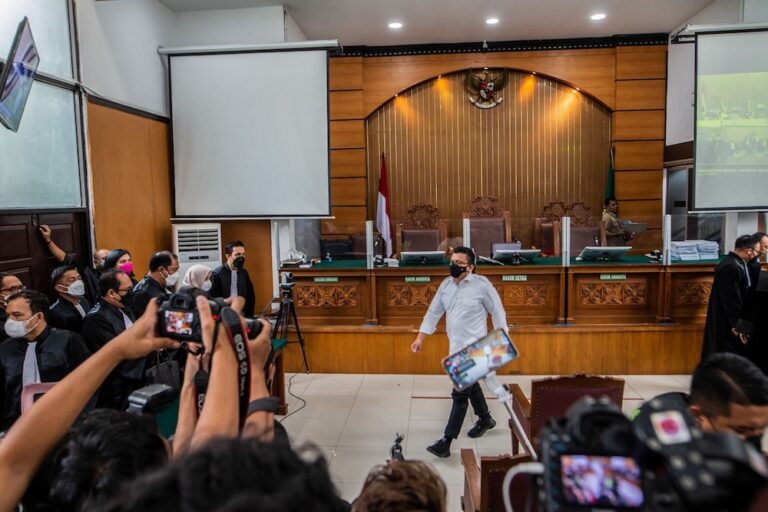(AJI/IFEX) – The Alliance of Independent Journalists (AJI) Indonesia slams the use of criminal law in solving press-related disputes. AJI Indonesia also condemns the continued violence against journalists in the course of their duties. At least 64 cases of violence against Indonesian journalists were recorded from August 2005 to August 2006. Furthermore, three murder cases […]
(AJI/IFEX) – The Alliance of Independent Journalists (AJI) Indonesia slams the use of criminal law in solving press-related disputes. AJI Indonesia also condemns the continued violence against journalists in the course of their duties. At least 64 cases of violence against Indonesian journalists were recorded from August 2005 to August 2006.
Furthermore, three murder cases of journalists have yet to be solved: Fuad Muhammad Syafruddin of the “Bernas” newspaper in Yogyakarta, who died on 16 August 1996; Elyudin Telaumbanua of the “Berita Sore” newspaper in Medan, who was kidnapped on 24 August 2005 and allegedly beaten to death, although his body was never found; and Herliyanto, a freelance journalist in Probolinggo.
AJI Indonesia also denounces the imposition of the Criminal Code on Fakhrur Rahman, a student activist from the Syarief Hidayatullah Islamic State University, who had participated in a peaceful rally protesting the policies of President Susilo Bambang Yudhoyono’s administration. On 30 October 2006, the South Jakarta District Court sentenced him to three months of imprisonment for defaming the president.
AJI Indonesia also expresses deep concern over the ban on the movie, “Dendam Pocong”, by the Film Censorship Agency (LSF) on 26 October. Among the nine objections to the movie, directed by Rudi Soedjarwo and produced by Sinemart Pictures, were that it was not in line with public norms of good manners (it had a rape scene), and more than 50 percent of its content featured violent and crime scenes.
Although the Supreme Court of the Republic of Indonesia has strongly stated that legal actions using the criminal code on the press endangers a free press, there are still four criminal cases being heard in court, namely: the case of Supratman, executive editor of “Rakyat Merdeka”, for defaming the president; Risang Bima Wijaya, editor-in-chief of “Radar Yogya”, for defamation; Teguh Santosa, executive editor of “Rakyat Merdeka Online”, for “religious defamation”; and Karim Paputungan, editor-in-chief of “Rakyat Merdeka”, also for defamation.
The existence of a process of criminalization of journalists and controls on freedom of expression violates Article 19 of the Universal Declaration of Human Rights, Article 19 point (2) of the International Covenant on Civil and Political Rights, which was ratified by the Indonesian government through Law No. 12 Year 2005, and Article 28F of the Second Amendment of the 1945 Constitution, as well as Article 14 and Article 23 point (2) of the Law No. 39 Year 1999 on Human Rights.
AJI Indonesia demands that the Indonesian government guarantee the safety of journalists and freedom of expression for everyone in Indonesia. AJI Indonesia also urges the Indonesian government and the National Police to immediately undertake a full investigation into murder cases of journalists and bring the perpetrators to court. AJI Indonesia calls on the Indonesian government to strive to ensure the safety of journalists, bring the perpetrators of violence against journalists to court, and not to threaten freedom of expression with the Criminal Law.


